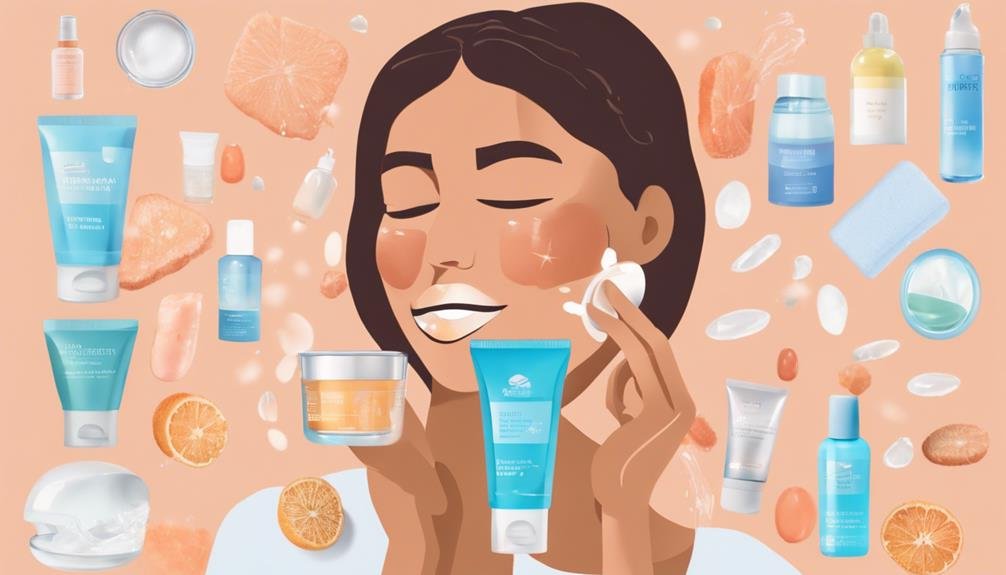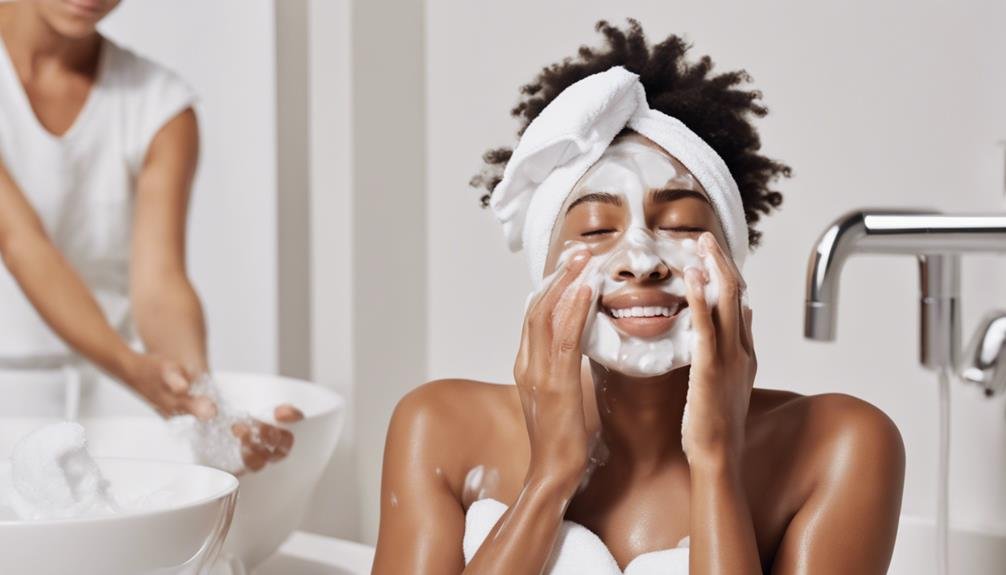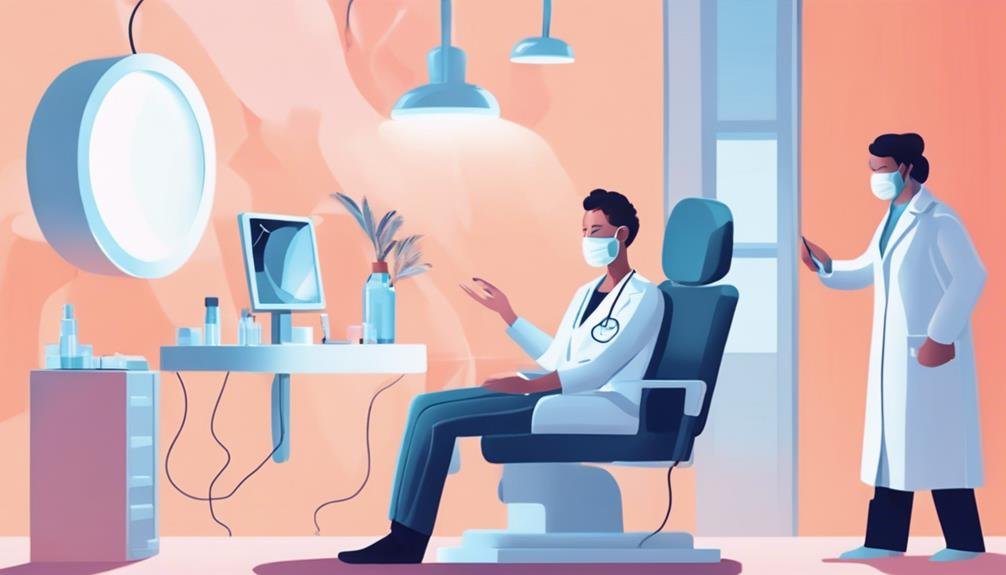Did you know that around 85% of people between the ages of 12 and 24 experience acne at some point? Keeping your skin clear of acne requires a multifaceted approach that goes beyond just surface treatments. Understanding the underlying causes, establishing a tailored skincare routine, maintaining proper hydration levels, and making smart product choices are key elements to achieving clear and healthy skin. But there's more to uncover when it comes to effective strategies for acne prevention and management.
Understanding Acne Causes
When it comes to understanding acne causes, it's essential to recognize that various factors contribute to this common skin condition.
Hormonal imbalance plays a significant role in the development of acne. During puberty, an increase in androgen hormones can lead to excess oil production, which can clog pores and result in acne breakouts. Additionally, fluctuations in hormones during menstrual cycles or due to conditions like polycystic ovary syndrome (PCOS) can also trigger acne flare-ups.
Genetics also play a crucial role in acne development. If your parents had acne, you're more likely to experience it too. Certain genetic factors can influence how your skin produces oil, sheds dead skin cells, and responds to bacteria, all of which can impact acne formation.
Understanding these underlying causes can help you tailor your skincare routine and treatment plan effectively. By addressing hormonal imbalances through lifestyle changes or medications and considering your genetic predispositions, you can better manage and prevent acne breakouts.
Developing a Skincare Routine
To properly care for your skin and manage acne, establishing a consistent skincare routine is crucial. Using the right skincare products tailored to your skin type is essential.
Start with a gentle cleanser to remove dirt and excess oil. Follow up with a treatment containing acne-fighting ingredients like benzoyl peroxide or salicylic acid. Moisturizing is also important, even if you have oily skin. Opt for a lightweight, non-comedogenic moisturizer to keep your skin hydrated without clogging pores.
Incorporating sunscreen into your daily routine is non-negotiable. Choose a broad-spectrum SPF of at least 30 to protect your skin from harmful UV rays that can worsen acne and cause premature aging.
Consistency is key when it comes to skincare routines. Stick to your daily regimen, even on days when your skin looks clear. Remember, prevention is easier than treating acne once it appears. By following a simple yet effective daily routine, you can help keep your skin clear and healthy.
Importance of Hydration

Maintaining adequate hydration is essential for overall skin health, especially when dealing with acne. Hydration plays a crucial role in supporting your skin barrier function, which acts as a protective shield against external aggressors. Proper water intake helps maintain skin elasticity, reduces inflammation, and promotes overall skin health.
To emphasize the importance of hydration, let's take a look at the following table:
| Benefits of Hydration for Skin | ||
|---|---|---|
| Supports skin barrier function | Improves skin elasticity | Reduces inflammation |
| Promotes overall skin health | Hydrates skin cells | Enhances skin texture |
| Boosts natural glow | Flushes out toxins | Prevents dryness |
| Regulates oil production | Improves skin tone | Prevents clogged pores |
Choosing the Right Products
For optimal management of acne, selecting the appropriate skincare products plays a crucial role in maintaining clear and healthy skin. When it comes to product selection, it's essential to look for items that are non-comedogenic, meaning they won't clog your pores. This can help prevent breakouts and promote clearer skin. Additionally, conducting thorough ingredient research is key.
Look for products containing salicylic acid, benzoyl peroxide, or retinoids, as these ingredients are known for their acne-fighting properties.
Avoid harsh products that strip the skin of its natural oils, as this can actually worsen acne by triggering excess oil production. Opt for gentle cleansers and moisturizers that are suitable for acne-prone skin. Consider consulting with a dermatologist to determine the best products for your specific skin type and acne concerns.
Incorporating Healthy Diet

As you focus on managing acne, remember that your diet plays a significant role in the health of your skin. Incorporating nutritional supplements like zinc, vitamin A, and omega-3 fatty acids can help support healthy skin and reduce inflammation. These supplements can be found in foods like fish, nuts, seeds, and leafy greens.
Additionally, incorporating detoxifying foods such as fruits, vegetables, and green tea can help eliminate toxins from your body that may contribute to acne breakouts.
Nutritional supplements like zinc have been shown to help reduce acne severity and inflammation. Vitamin A plays a crucial role in skin health by promoting cell turnover and reducing clogged pores. Omega-3 fatty acids have anti-inflammatory properties that can help calm irritated skin.
Detoxifying foods like berries, citrus fruits, and cruciferous vegetables help support the body's natural detoxification processes, keeping your skin clear and healthy.
Managing Stress Levels
Stress management is crucial when it comes to maintaining clear and healthy skin. High stress levels can trigger hormonal changes that may lead to acne breakouts. To keep your skin in check, consider incorporating mindfulness techniques and relaxation exercises into your daily routine.
Practicing mindfulness involves being present in the moment and focusing on your thoughts and feelings without judgment. This can help reduce stress and promote overall well-being, which in turn benefits your skin. Techniques like deep breathing, meditation, and yoga are great ways to cultivate mindfulness and manage stress effectively.
Relaxation exercises, such as progressive muscle relaxation or guided imagery, can also aid in lowering stress levels. These practices encourage relaxation of the mind and body, which can contribute to clearer skin by reducing the release of stress hormones that may exacerbate acne.
Practicing Good Hygiene

Maintaining good hygiene practices is essential for keeping your skin clear and healthy. Proper cleansing is key to removing dirt, oil, and impurities that can clog pores and lead to acne breakouts. Use a gentle cleanser suitable for your skin type, and wash your face twice a day to maintain cleanliness without stripping away essential oils.
In addition to cleansing, regular exfoliation is crucial for preventing dead skin cells from accumulating on the surface of your skin. Exfoliating 1-2 times a week can help unclog pores, promote cell turnover, and leave your skin looking fresh and radiant.
However, be cautious not to over-exfoliate, as this can irritate your skin and exacerbate acne.
Avoiding Common Mistakes
To ensure optimal skin health and reduce the likelihood of acne breakouts, it's crucial to be aware of common mistakes that can inadvertently harm your skin.
One common mistake is improper cleansing. Using harsh cleansers or overwashing can strip your skin of its natural oils, leading to dryness and potential breakouts. To avoid this, opt for a gentle cleanser that suits your skin type and wash your face no more than twice a day.
Another mistake to avoid is aggressive exfoliation. While exfoliating is essential for removing dead skin cells and unclogging pores, being too harsh can irritate your skin and worsen acne. Choose a mild exfoliator with gentle ingredients like salicylic acid or glycolic acid, and use it no more than 2-3 times a week.
Seeking Professional Help

If you find that your efforts to maintain clear skin aren't yielding the desired results, it may be time to seek professional help. A dermatologist consultation can provide you with valuable insights into the underlying causes of your acne and personalized treatment options. Dermatologists are medical professionals specializing in skin health, equipped with the expertise to assess your skin condition and recommend effective solutions.
During a dermatologist consultation, the healthcare provider will examine your skin, discuss your medical history, and tailor a treatment plan to address your specific needs. Treatment options may include prescription medications, topical treatments, professional procedures like chemical peels or laser therapy, and lifestyle modifications. These interventions are targeted at reducing inflammation, unclogging pores, and preventing future breakouts.
Remember that acne is a complex skin condition influenced by various factors, and seeking professional help can significantly improve your skin health. By collaborating with a dermatologist and following their recommendations, you can embark on a journey towards clearer, healthier skin.
Frequently Asked Questions
Can Hormonal Changes Affect Acne Breakouts?
Yes, hormonal changes can significantly impact acne breakouts. Hormonal imbalance can lead to increased sebum production and inflammation, contributing to acne. Maintaining a consistent and appropriate skin care routine tailored to your skin type can help manage hormonal acne effectively.
Is It Safe to Pop Pimples at Home?
Like a gardener tending to a delicate rose garden, resist the urge to pop pimples at home. Home remedies may worsen skin care issues. Opt for professional guidance on safe acne management for clear, healthy skin.
How Long Does It Take for Acne Scars to Fade?
Acne scars can take several weeks to years to fade, depending on their severity. Implementing a consistent skincare routine with products like vitamin C serums and retinoids can help. Supporting skin healing with a balanced diet is crucial.
Does Wearing Makeup Worsen Acne?
When you wear makeup, remember that proper makeup removal is essential to prevent skin irritation. Choosing non-comedogenic products and cleansing your face thoroughly can help minimize the risk of exacerbating acne.
Can Lack of Sleep Contribute to Acne?
Lack of sleep can exacerbate acne due to increased stress hormones and disrupted skin repair processes. Adequate rest is crucial for skin health, alongside diet influence and stress impact. Prioritize quality sleep to support clear skin.
Conclusion
In conclusion, clear skin is not just a goal, but a journey requiring dedication and consistency. Remember, "prevention is better than cure." By understanding the causes of acne, developing a tailored skincare routine, staying hydrated, choosing the right products, maintaining a healthy diet, managing stress levels, practicing good hygiene, and seeking professional help when needed, you can achieve and maintain clear, healthy skin. Stay committed to your skincare journey, and you will see the results you desire.




